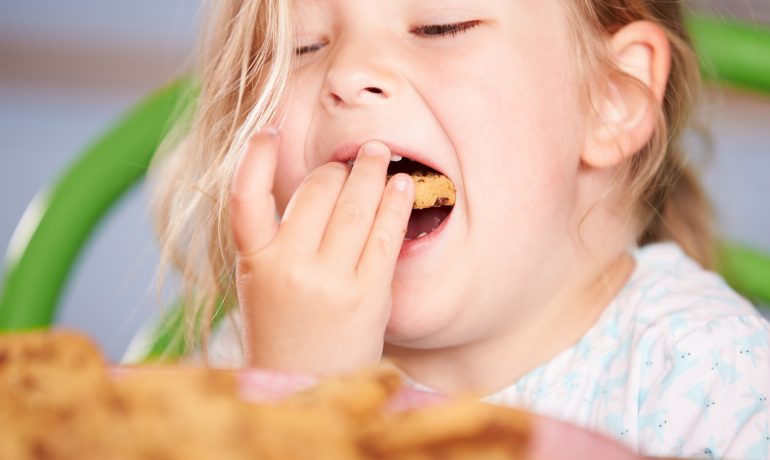We all know the obesity rate in the world has risen significantly over the past few decades. The scarier thing is that it is affecting not only adults but now children. And can definitely be a life-long, uphill battle. Obesity results from overeating and I read a recent research abstract that has taken this one step further, explaining that emotional eating is a learned behavior instead of it being a hereditary quality. Also, it can begin as early as the preschool years, which I completely understand. I mean, you absorb so much information during the first years of life, and you have to eat every day.
Negative emotions can create over eating, or under eating, as a learned behavior. The articles I have seen suggest that parents teach their children unintentionally, such as giving a favorite treat when the child is upset. Over eating is most associated with stress imposed upon the person, and under eating can be a sign of distress as a protective measure. Although, I believe that parents or family traditions are not the only causes for a child to over eat.
Trauma can be a Bad Teacher too…
There are a number of things that a child can consider traumatic, and negative emotions can certainly feel alarming at a very young age. I can remember falling from a riding toy at the age of 3 or 4. While at the moment it was horrifying, a little while later I was fine. We may all have memories such as that, just the usual pains of growing up and getting boo-boos.
Personally, I experienced a family tragedy as a youngster at the age of 10. It was not until the incident that I really began to notice truly unfavorable emotions. By the time I was 13 and social pressures were heightened (think teen years and hormones and middle school) that I began to discover stress could be soothed. In my experience, I learned that food was a comfort from the food itself and not from anyone in particular. But, there was also not any guidance as to why too much food should not have been taken in. So, in my opinion, there is a combination of the availability of detrimental foods and perhaps the lack of parental monitoring (allowed to have the second bowl of pasta, it has been a tough day).
Yet, with each person’s personality (mine being a little rebellious), I am not sure I would have listened to anyone’s advice in those formative teen years because I, of course, knew it all and no one could tell me what to do… There can be so many variables as to why one youth could have a bad experience yet respond with no effect on eating patterns, and another would have a life long impact.
You and I both know that being over weight is not ideal, or even healthy. Yet with all the scholarly knowledge in this world, our portly problem has reached an epidemic level. According to one site, 38% of adults report that they will consume extra food and calories when they feel stressed or sad. There have been at least two studies regarding how little ones pick up on bad eating habits. One study in the UK involved many sets of twins looking for a connection between genetics. Another study in Norway investigated if toddler children grasp eating behaviors from parents offering comfort foods.
It turns out that:
- youngsters eat differently when agitated or disrupted, not indicating that they inherit behaviors from genes.
- Being male or female was not a significant factor.
- In the Norway study parents were shown to have an influence.
In light of the studies conducted and general observations in our own communities I think you can agree. We must address stress and negative feelings that contribute to all our eating behaviors. It is difficult in this era to have access to so much, that which requires us to resist in order to to thwart gluttony. The opposite is anorexic behavior, although this eating disorder does not appear to be nearly as prevalent.
I believe it is paramount that we keep trying to reverse these heavy weight trends. When we are around tots of any age, let’s make an effort to console any emotional boo-boos. Maybe we can make a difference with our words.
You can read on the emotional benefits of exercise.
Let us know what you think!


